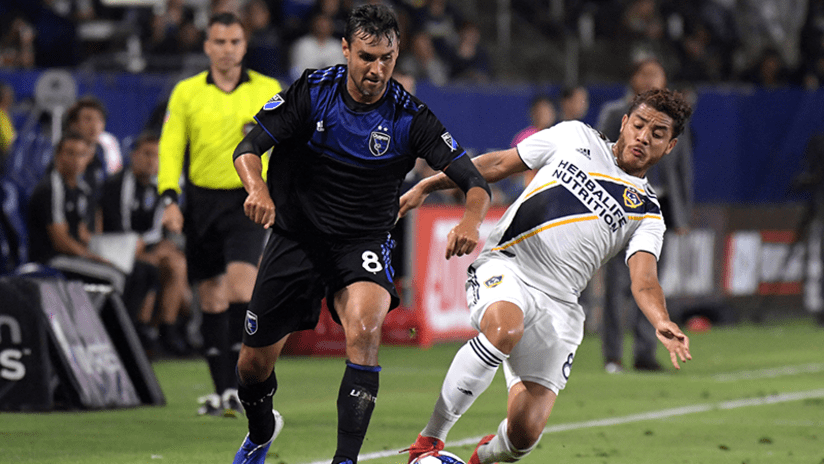Editor's note: This piece originally ran in 2020 but has been updated and re-shared ahead of Friday's California Clasico between the LA Galaxy and San Jose Earthquakes (10:30 pm ET | ESPN2)
As far as MLS rivalries go, it's hard to get more historic than the California Clasico between the LA Galaxy and San Jose Earthquakes.
Both clubs are MLS originals, though the Earthquakes name went dormant for two seasons when the first club moved and became the Houston Dynamo.
And you'd be hard-pressed to find a more decorated fixture in MLS. The Galaxy are the only five-time MLS Cup winners, plus boast a Concacaf Champions Cup and two U.S. Open Cup titles to their name. But San Jose also hoisted MLS Cup twice, once even beating their arch-nemesis to do so.
The California Clasico also presents a clash in ideology. There's the glitz and glamour of an L.A. team that's boasted global icons like David Beckham, Zlatan Ibrahimovic and now Javier "Chicharito" Hernandez. On the other hand, the grit and determination of San Jose is represented perfectly by the long and unlikely career of MLS all-time scoring leader Chris Wondolowski.
It's a fixture with a long and winding narrative, and one that's heavily intertwined with the most important American player in MLS history.
Roots of a Rivalry
Both teams — originally the Los Angeles Galaxy and the San Jose Clash — were among the 10 founding members of MLS, and among the closest to each other geographically (exceeded only by the NY/NJ MetroStars' proximity to New England and D.C.). And through the end of the '90s, the Galaxy were a bit of a bridesmaid club, while the Clash struggled for local relevance.
That all changed in 2000, when San Jose adopted the Earthquakes moniker in homage to previous pro teams in the region in the '70s and '80s. The following year they landed prodigious American attacker Landon Donovan, then 19, on loan from Bayer Leverkusen.
Donovan was far from the only star who flipped the script in the 2001 MLS Cup, defeating LA 2-1 for the first trophy in club history. By the time the Quakes repeated, he was an MLS Best XI talent and member of the most successful US men's national team World Cup showing in more than a half-century. That all made his move from San Jose to LA in 2005 (via one brief final stop at Leverkusen) one of the most bitterly received by any fanbase in MLS history.
From there, the trophy winning slanted decidedly in the Galaxy's direction, with the first version of the Quakes bolting for Houston following the 2005 season and Northern California's MLS fans forced to wait two years for a replacement. LA won four of their five titles with Donovan in the fold, joined first by Beckham and then by Robbie Keane as the Galaxy's star-studded reputation truly took flight.
The new Quakes eventually emerged with an even more blue-collar identity, forged by the better-late-than-never rise of Wondolowski alongside other heroes like Steven Lenhart and Alan Gordon. Version 2's only major trophy so far has been that memorable Goonies-inspired run to the 2012 Supporters' Shield, but they've had plenty of fun and success ruining plans for their rivals to the south.
Memorable Moments
The Galaxy have had most of the success overall. But the most dramatic moments largely belong to the Quakes:
2001 MLS Cup: Luis Hernandez put the Galaxy in front, but Donovan answered with his first MLS Cup goal before halftime. Then came Dwayne De Rosario's golden goal six minutes into extra time, leaving the Quakes as champions and the Galaxy as MLS Cup losers for a third time in six years.
The Greatest Comeback In MLS History: In their 2003 Western Conference Semifinal, the Galaxy took a 2-0 win in the first leg of the aggregate goals series, then found the net twice more to open the return leg in Spartan Stadium. What happened next? A comeback the likes of which is still nearly impossible to believe, with the Quakes ultimately winning 5-2 on the night and scoring a 5-4 victory on aggregate. They went on to win their second MLS Cup.
"Goonies Never Say Die:" The quote from the 1980s comedy The Goonies became a rallying cry for the 2012-14 Quakes, who became notorious for magical last-moment victories. Perhaps none were more miraculous than in 2013, when Shea Salinas and Gordon found the net in the second and third minutes of second-half stoppage time, respectively, to lift 10-man San Jose to a 3-2 win over the Galaxy.
Regular Season
The Galaxy lead the regular-season series with a record of 34W-26L-16D, while scoring 118 goals in 76 matches and conceding 109. It's been a different story in recent years, even with relative instability at both clubs, as San Jose have taken 20 points from the last 12 meetings since 2017.
To say the Galaxy were dominant in the early years of the fixture is a bit of an understatement. In the first five seasons of MLS, the rivals had 20 league meetings, with the Galaxy winning 14 and drawing two more.
Lamar Hunt U.S. Open Cup
This is the sphere where the Galaxy have been most dominant, going 4-1-1 in six Open Cup meetings (and advancing on penalties following their one draw). The Quakes enjoyed the latest laugh, however, emerging victorious in USOC play during a 2017 quarterfinal.
Audi MLS Cup Playoffs
The Galaxy have a slim 3-2 advantage in total playoff "series," and a 5-4-1 record in individual games. Although the Quakes have the biggest win, defeating the Galaxy on De Rosario's golden goal, the Galaxy have victories over San Jose in the 2005 and 2012 Western Conference Semifinals en route to MLS Cup victories.
The clubs haven't met in the Audi MLS Cup Playoffs since that 2012 meeting, with at least one of them failing to reach the playoffs in every year since.














